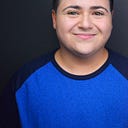Cursed Child Revamped: Implied Queerness
First things first, I would call this play: Harry Potter and a Life Beyond Her.
She taught us all that saying a name takes away its power, but her supporters are rather unkind, to say the least. I won’t name her here. I also won’t give the big spoilers because I’m not a monster. It was a cool show, though.
As a gen Z- millennial cusp, the books and films have meant a great deal to me over the years, and I avoided this “fanfic” that “besmirched” her work. Until she was no longer untouchable and worth preserving and I was able to let go. And once I had reason [two reasons, both excellent artists and kind souls] to go despite not wanting to give her a red cent, I got to see that while this play [I have only seen the new one, not the two-parter] is far from perfect, while she still collects royalties, while her work laid a foundation, it departs greatly from her myopic vision.
There are people more brilliant and qualified than I who could go in-depth into the deliberate decision made to have a Black Hermione, a decision that further highlights the allegories surrounding race in the original franchise.
I’m definitely queer, however, and do feel I can look at the show’s queer history and present and go into it more earnestly in three areas-
Theme/Plot
The theme of wanting to change things and gain acceptance from your family is a pretty queer one. Visibility and invisibility, bullying for being different, trying to find the right way to present or perform social norms, also gay. Transfiguration/ polyjuice potion… arguably commentary. All of the hiding and sneaking around is reminiscent of being closeted… Side note, her obsession with men in women’s bathrooms shows up even in this play much like in her books and her bigotry, and it continues to be strange as ever.
Characters
Scorpius and Albus… one of the nicest Slytherins ever and Harry’s wayward son. Have a sort of implied romance, they even talk about how they’re the most important to one another and how they feel about hugging and some people have said this is amazing and others feel it is not enough to be deemed queer. I fall in between- I’d like more but it’s still her property, and also, they’re rather young. I get that we get media representation of straight people being more intimate from a very young age, but I don’t know that I agree with that or that in a heteronormative society queer people are ready to express feelings as early. I also generally don’t feel that all rep has to be blatant, and certainly not in this case. To me, it was noticeable, but subtle, and also not crammed in there for tokenism. Their love is organically on par with the love everyone else shows one another in the franchise, albeit desexualized, which again, they’re kids, I do think that’s ok. Not to mention, by having queer people in the role of Scorpius, that does inform the character at least somewhat, which brings me to:
Actors
Throughout the history of the production, there have been a number of queer, and more notably trans/nonbinary performers in the cast of Cursed Child, some of whom I know and am fond of them and their work. I feel obviously conflicted sharing this. First, whose business is that? It shouldn’t have to be a big deal. But it is when this was the first Broadway show to have an out transmasculine performer, it’s still one of the only, and the writer of the source material is an avowed hater of trans people. It’s complicated. But that’s also kind of cool that all these queer and trans performers are sticking it to her, simply by doing their job. They get to have fun and make art [and get paid!] and she doesn’t get in their way. I want to see more works by trans people and trans allies and with trans team members rise up, but for now, it’s cool and ironic and sad that this show has been a steadier employer for trans/nonbinary people than many.
The show is not the next Angels in America, especially since it’s been truncated to one part. It’s not about being queer. It certainly doesn’t presume or force the level of straightness or whiteness in the original books/films [Dumbledore was an afterthought we all know it]. However, it brings up an excellent question of striking the balance between tokenism and representation and I think it errs on the side of caution/downplaying queerness but has a message of unconditional love from parents to kids and a real, genuine love between two boys that is treated with respect.
